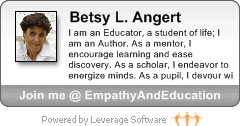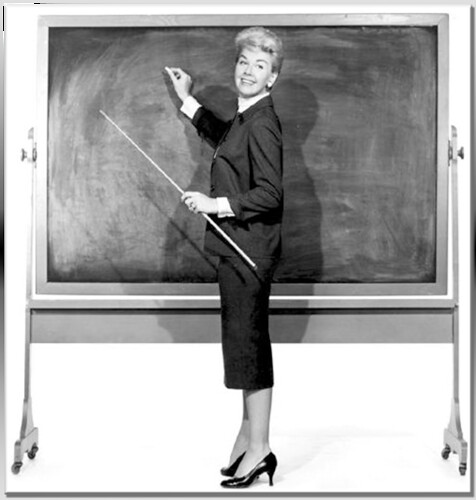(11 am. – promoted by ek hornbeck)
copyright © 2011 Betsy L. Angert. Empathy And Education; BeThink or BeThink.org
He who can, does; he who cannot, teaches
~ George Bernard Shaw [Man and Superman, 1903]
“A fool’s brain digests philosophy into folly, science into superstition, and art into pedantry. Hence University education.”
~ George Bernard Shaw
I heard the words for as long as I recall. The meaning was intricately woven into my mind. I, as all little children since George Bernard Shaw scribed his belief, “He who can, does; he who cannot, teaches,” was taught to believe that Teachers could choose no other career. Educators, entrusted with children’s lives were indeed, incapable beings. These individuals had tried and failed to perform well in professions that required intellect and, or dexterity. Because the incompetent were inept, they fled to schools and identified themselves as “Teachers.” In classrooms, less than sage scholars could teach with little authentic expertise. Today, as a culture, Americans choose to prove this erroneous truth. Grading the Teachers: Value-Added Analysis.
Happily, our fellow citizens dismiss the “scientific” evidence that amasses. In our stupor we embrace Value-Added Analysis, disregard the research revealed in a 2010 Department of Education report, Error Rates in Measuring Teacher and School Performance. “Consideration of error rates is especially important when evaluating whether and how to use value-added estimates for making high-stakes decisions regarding teachers.”
Americans do as they have done for well over a century; they look to those they love for guidance and validation, be it George Bernard Shaw or the Gates Foundation. One loosely proclaims Teachers are incapable. The other spends $45-million dollars only to assert what his organization hoped to prove Study supports teacher ratings. Yet, in truth the findings are extremely flawed. Thus, is the logic of learning. As a society rarely do we reflect upon the original source of the “sage” wisdom we subscribe to.
The “Decline Effect” escapes us. Might it be that ignorance is bliss? Perchance, in regards to lessons learned, and unlearned, it is.
How Do We Learn or Unlearn?
Let us begin with a look behind the statement that sways the public, the story of George Bernard Shaw. Historical records reveal, the Playwright loathed his primary Professor, his father. Possibly, this detail supports my own truth, and perchance yours. A number of those who provided lessons never knew they did. Moms are mentors. Dads are guides. It is why any of us may accurately muse, “more is caught than taught.” George Bernard Shaw learned from a master he detested. Thus, as a child, Shaw concluded, those who counsel are not qualified to give advice.
I acknowledge, a few erudite individuals had no idea they taught or that they were my best tutors, even by being the worst. This is true in homes and equally the case in classrooms. Even in exchanges with random Educators we meet in life, be they the butcher, the baker, or candlestick maker, some sages teach us in sensationally pleasant ways. Others offer lessons that are authentically painful to us. Nonetheless, we learn. I believe had George Bernard Shaw not been so severely scarred in his childhood home, he too would have acknowledged this wisdom.
Frequently, Mommies and Daddies seem, as Shaw might ascribe, anathema as Teachers. My biological parents could have been characterized this way, and each was by a sibling or two. I share.
When I was a toddler, I learned to walk, to talk, and to toilet train myself. Granted, in the abstract, I had role models. Concretely? Not so much. Hence, my guru was my own grit and gumption. Later, in my youth, I sought a scholar when I wanted to study how to ride a bicycle.
Mommy and the man who was called father were busy. They had but minutes a day to help me work on maintaining my balance. The automobile parked safely in the garage had hours to spend. Therefore, I held the little Rambler’s hand or she held mine. For days, I devoted much time to circling the car. With one palm on the vehicle and the other on the handlebars, I went round and round until finally I trusted myself to do other than lean. Then, I let go. My Teacher, the red Rambler, released me from what seemed a spell only when she sensed I understood.
The steel scholar had not pushed me; nor pulled me down. That sweet metallic body let me be “me.” Munificence, benevolence, largesse, and the gift of trust are qualities that few have. I know not if these can be taught. I do believe that if they are learned, a semester of lessons is not enough.
As a very young child, I realized that no one around me was an authentically patient prospect. People pretended whilst they profess, they knew the way. I can; therefore, I will teach is often the stated premise. In actuality, in my life, the knowledgeable are frequently ill equipped to provide quality instruction. Less inspire. However, early on and even today, I do not endorse the conventional wisdom. “Mature” men and women posit, “My mother and father did the best they could.” I would disagree.
My theory is less than lovely parents teach in manners, perhaps somewhat different, still, similar to those their parents favored. Teachers do too. If an Instructor learned to maintain an emotional distance, to lecture, rather than relate to a whole child, he or she will embrace this method. If statistics, scores, and specific learning strategies spoke to a Teacher when they were a student, the probability is high that techniques that utilize such conventions will be their chosen standard.
I learned from my Mom who transformed before my eyes, this was her truth . . . that is until she realized how her path had hurt her children. Thus, I trust Teachers too can chose to be aware of how they ways work or are less effective for any learner. Countless do. Fortunately for me, innumerable gurus have been my guides, much more so than the musings of George Bernard Shaw ever were.
I wonder. In the world of teacher evaluation might we examine our beliefs more closely. Could we not learn from a bit of real life reflection. Let us not so quickly endorse the data that proves what we came to believe in childhood. May each of us take a moment to sit with our reveries. Reason. Evaluate the history of “decline effects.” Might we ponder the vast body of research results that do not merely restate or support simplistic, long-sanctioned, supposed “solutions.” Let us hold dear our personal memories and recall, not every Teacher is anathema to the notion of education. I ask you to have faith as I do; those who can do teach!
References for a repeated reality . . .
- Value-Added Analysis. The Los Angeles Times.
- More Thoughts on the “Decline Effect,” By Jonah Lehrer. The New Yorker. January 3, 2011
- Error Rates in Measuring Teacher and School Performance Based on Student Test Score Gains. By Peter Z. Schochet and Hanley S. Chiang. Mathematica Policy Research. July 2010
- Review of Learning About Teaching. By Jesse Rothstein. University of California Berkeley. National Education Policy January 2011
- Grading the Teachers: Value-Added Analysis. The Los Angeles Times.
- Parents have the right to know, By George Skelton. The Los angels Times. August 23, 2010
- New merit pay bill filed in Senate. By Leslie Postal. Orlando Sentinel. January 31, 2011
- Study supports teacher ratings, By Jason Felch. Los Angeles Times. December 11, 2010
- Formula to Grade Teachers’ Skill Gains Acceptance, and Critics, By Sam Dillon. The New York Times. August 31, 2010
- Do Teacher Ratings Pass the Test? To The Editor. The Los Angeles Times. January 1, 2011


